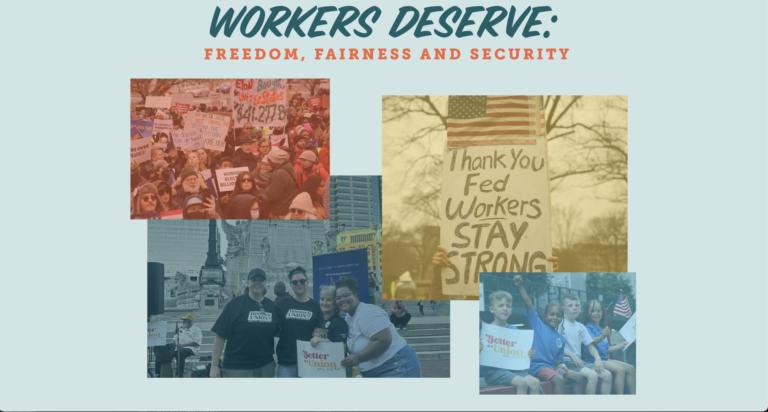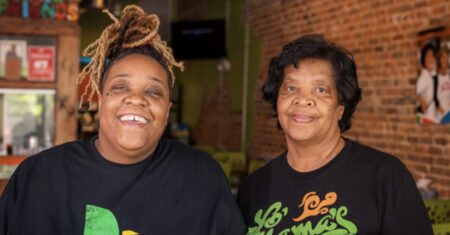By Fred Redmond
The country just celebrated Labor Day and the contributions working people and unions have made toward a more equitable and just society.
Throughout our history, the labor movement has marched, fought and stood together to win every bit of progress: to end child labor and make dangerous jobs safer. For fair wages, affordable health care, time off to spend with family. For dignity and respect, no matter where you come from or the color of your skin.
When we demanded an eight-hour workday—they called it unrealistic. When we said we deserve health and safety measures because our jobs shouldn’t kill us, they said the bosses would never give in. When we insisted workers deserve a minimum wage, they scoffed at us. But our collective power made it happen.
Black trade unionists have played a critical role in—and often were the backbone of—all those victories.
In 1881, the Atlanta Washerwoman Strike became one of the first recorded strikes led by Black women in the United States. They were threatened and ridiculed as they fought for fair treatment, higher wages, and some control over their work. But they stood together and ultimately achieved their demands.
One hundred years ago, at a time when Black workers were expected to be grateful to have a job, service workers on luxury sleeping cars, known as the “Pullman porters” were often degraded, marginalized and underpaid. Under the leadership of A. Philip Randolph, the fearless and outspoken advocate, these workers organized and formed the Brotherhood of Sleeping Car Porters union.
Dr. Martin Luther King Jr. made clear that the fight for civil rights and labor rights are one and the same. At the 1961 AFL-CIO Convention, Dr. King declared, “Our needs are identical with labor’s needs….[A]ny crisis that cuts the labor movement…means we all bleed.” In 1968, it was a sanitation workers’ strike that brought him to Memphis, Tennessee, where he was assassinated the day after speaking to union members.
Today, Black workers are continuing that tradition, particularly in the South. At Volkswagen in Chattanooga, Tennessee Black organizers led their co-workers to historic victories to win the first-ever Southern autoworkers to win a union. Waffle House workers came together in a first-of-its kind collective action, going on strike and winning raises for themselves and their co-workers at the company nationwide. And at Blue Bird, an electric school bus company where the majority of workers—especially lower-paid and front-line workers—are Black, employees won a historic battle against vicious union-busting to form their first union.
But in the labor movement, we know our work is never done. Trump claims to put America’s workers first. But he’s killing our jobs, firing hundreds of thousands of federal workers, reversing progress on American manufacturing, and relentlessly attacking immigrant workers and their families. He’s going after our unions and the rights of working people, moving to eliminate collective bargaining from nearly 1 million federal workers with the stroke of a pen— including significant numbers of Black workers—doing the essential work that our communities count on.
Trump even rang in Labor Day by stripping even more federal workers of their union rights. And then he spent the long holiday weekend golfing, while the people who work for a living and actually make this country run—food and service workers, nurses and sanitation workers, and others—continued to show up to work without a day off.
This fight is about more than just unions. When they strip away these rights, they’re not just targeting government employees—they’re attacking the very foundation of our communities. When they cut funding for health care and education for working people but hand out tax breaks to billionaires, they’re making a choice about who matters in this country.
But when working people come together, we have more power than any of us alone. We can stand up to the wealthiest oligarchs and the most powerful politicians, to their corporate interests that have led to extreme inequality. We can fight back against an administration that has turned our government against us—occupying cities, criminalizing the poor, scapegoating Black and Brown people, attacking and retaliating against anyone who opposes its agenda. And we can face those who are trying to bust our unions so they can pay us less, make our jobs less safe, keep our futures less secure and hold us down in the race to the bottom.
This is Workers’ Labor Day, and we’re fighting for what workers deserve. Join us.
Fred Redmond, the highest-ranking African American labor official in history, is the secretary-treasurer of the AFL-CIO, the nation’s largest labor federation representing 63 unions and nearly 15 million workers.







